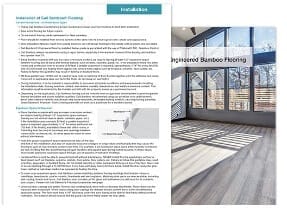Technologie Hybride
LARGE+ AU-DELÀ DE LA PLANCHE LARGE
La tendance étant aux planches plus larges, Large+ représente notre planche la plus large qui soit à ce jour.
Créé un impact visuel frappant à votre espace avec des planches 30% plus larges.
Obtenez un échantillon et voyez la différence par vous-même.

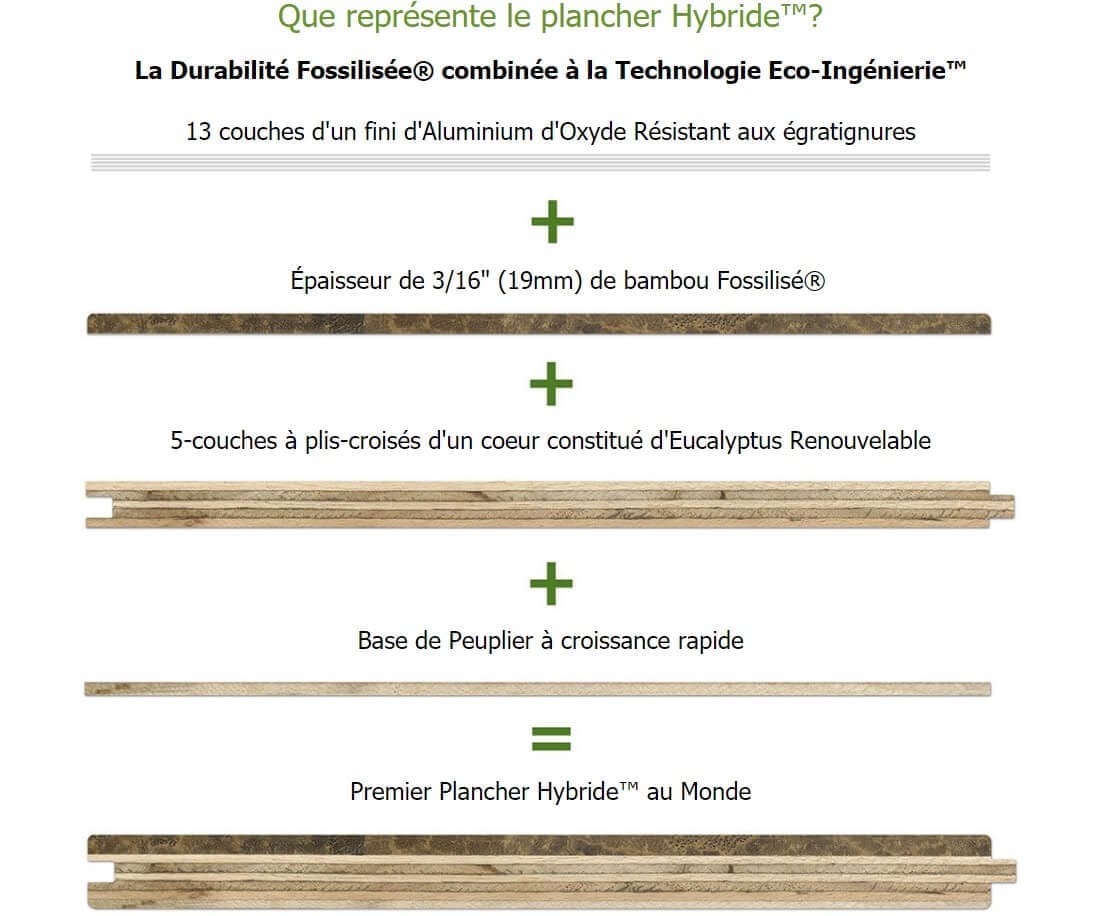
Les Planchers Fossilisés®, tout simplement les planchers les plus durs au Monde !
Cali Bamboo fabrique des planchers qui ne s’embosseront pas, ne s’égratigneront pas ou ne s’useront pas par l’usage quotidien.
Chacun des planchers offerts par Cali Bamboo est testé selon la bille Janka pour non seulement s’assurer qu’il répondra à la dureté recherchée mais également qu’il continuera d’avoir l’apparence d’un plancher nouvellement installé pour des années à venir. Les planchers d’ingénierie de bambou Fossilisés® Cali Bamboo représentent les planchers les plus Durs au monde, un classement sans précédent allant jusqu’à 5,547 livres force sur le test Janka!
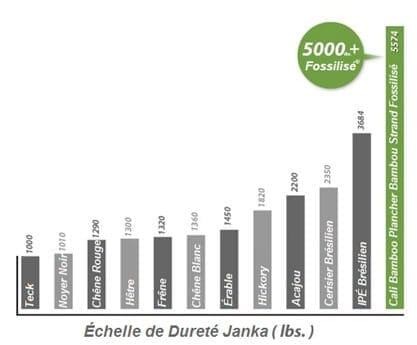
L’Échelle de Dureté Janka
L’Échelle de Dureté Janka, utilisée pour déterminer si une espèce de bois est appropriée pour être utilisé comme plancher, représente le test principal pour mesurer la résistance du bois à l’usure et aux égratignures. Comment le test fonctionne? Le test Janka mesure la force requise pour enfoncer la moitié d’une bille d’acier de 11.28mm dans une pièce de bois. Plus la force requise est élevée, plus haut sera le classement Janka et plus dur sera le bois.
Qu’est-ce que cela signifie pour vous
La combinaison unique de la structure Eco-Ingénierie Hyride™, jumelée d’une protection additionnelle de 13 couches ultra résistantes, crée un plancher qui saura résister à l’épreuve du temps… ainsi qu’à la vie quotidienne. Les planchers d’ingénierie de bambou Fossilisés® de Cali Bamboo® sont tout à fait désignés pour tout type de chiens, sont à l’épreuve des talons hauts et en comparaison de plusieurs autres planchers de bambou, sont sans émissions toxiques ou ajout d’urée de formaldéhyde. Les planchers de Cali Bamboo® représentent non seulement les planchers les plus durs mais également les planchers les plus sécuritaires pour la qualité de l’air de votre résidence ainsi que la santé de votre famille.

Des planchers d’ingénierie pour tous les étages de la maison
Les planchers d’ingénierie Cali Bamboo tirent partie du pouvoir que lui confère la technologie Eco-Ingénierie™ pour conquérir les soucieux problèmes de sous-sols représentant un défi pour toute installation sous le niveau du sol où l’expansion et la contraction sont amplifiés dû au taux d’humidité plus élevé. Avec les planchers d’ingénierie Hybride™, le système multi-couches croisées d’eucalyptus confère une stabilité et l’habilité de survivre aux niveaux d’humidité variables typiques à ces endroits.
* lorsqu’utilisé en combinaison avec Titebond® 531 Plus comme système de contrôle d’humidité.
Accessoires
Accessoires de planchers
La qualité réside dans les détails. Les accessoires des planchers Cali Bamboo sont fabriqués à partir des mêmes matériaux de haute qualité et sont soumis au même processus breveté de fabrication. Ils donnent à l’ensemble de votre projet de plancher un aspect élégant et professionnel.
Tous les accessoires sont disponibles sur demande et sont assortis au fini et couleurs de votre plancher.
9/16" Nez-de-palier Encastré
10’’ Grille de ventilation
12’’ Grille de ventilation
Respirez Librement
Les résultats des tests de laboratoires ASTM démontrent que les planchers de Cali Bamboo sont 100% 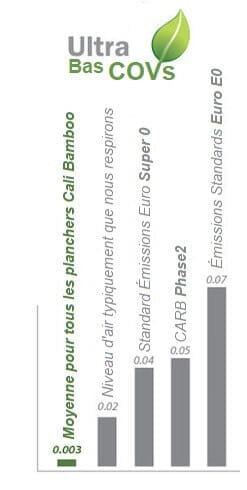 Ultra-bas en COV
Ultra-bas en COV
Lorsqu’il s’agit de qualité d’air intérieur, notre préoccupation première demeure le niveau d’émissions des composés organiques volatiles (COV) spécifiques tel le formaldéhyde. Bamboo Design a été le premier à vous offrir des planchers de bambou sans émanations de formaldéhyde dans son processus d’assemblage et nous sommes l’un des rares qui maintiennent un niveau de transparence en affichant le résultat de ses tests en ligne, accessible à sa clientèle.
- Plusieurs de nos planchers enregistrent un niveau de concentration « Not Detectable » de moins de 0.000 parties par millions (PPM) — cela signifie que ces planchers sont Ultra-Bas en COV.
- Ceux affichant un niveau de concentration détectable sont tout de même 50 fois plus bas que les émissions standards les plus rigoureuses CARB (California Air Resources Board) Phase2 (0.05 PPM).
- En fait, les résultats ont même démontré que tous les niveaux de concentration de formaldéhyde de nos planchers rencontraient au minimum la moitié de la concentration rencontrée dans l’air typiquement que nous respirons. (0.02PPM)
Au contraire de certaines compagnies qui coupent les prix par l’utilisation de matériaux de moindre qualité, Bamboo Design choisi de travailler avec les meilleurs fabricants au monde qui ont le souci de s’approvisionner de sources forestières durables de qualité supérieure et qui maintiennent un processus de fabrication irréprochable.
Respirez librement avec Cali Bamboo
Qu’est-ce que le formaldéhyde?
Cancérigène, le formaldéhyde est l’un des polluants les plus sérieux de nos intérieurs. Le formaldéhyde est un gaz incolore, très volatile qui est émis principalement par les produits ménagers, panneaux de bois et revêtements de plancher. L’odeur piquante, détectable à très faible concentration (à partir de 0,6 mg par mètre cube d’air) provoque des irritations et des inflammations des yeux, du nez et de la gorge et peuvent aggraver les symptômes de l’asthme chez les enfants et les nourrissons.
Gardez votre famille en sécurité et en santé en choisissant des planchers sans produits chimiques douteux. Cali Bamboo ne coupe jamais les coins ronds en ce qui a trait à la qualité des matériaux, adhésifs et techniques manufacturières et nous avons le résultat des tests pour le prouver!
Tous nos planchers sont Ultra Bas en COV, certifiés FloorScore® , la plus haute reconnaissance en qualité de l’air de l’industrie.
Installation & Maintenance
Effectuez l’installation et la maintenance de votre plancher comme un PRO!
Nous avons rassemblé dans ces documents toute l’information nécessaire à la bonne conduite de votre projet pour assurer une installation tout à fait impeccable.
Vous avez des questions additionnelles? Faites-nous signe !
Guide Pré-Installation
Évitez le dérapage en suivant ces deux étapes les plus importantes, l’acclimatation et les joints d’expansion.
Guides d’Installation
Simples à suivre voici les instructions officielles d’installation des planchers Cali Bamboo pour installer en toute confiance et assurer la réussite de votre projet.
Entretien & Maintenance
Apprenez à maintenir votre plancher en parfaite condition pour des années à venir en suivant ces étapes simples et efficaces pour l’entretien de votre nouveau plancher.
Crédits Leed®
Les Points LEED®
Tous les planchers de bambou de Bamboo Design & Architecture sont éligibles à l’obtention de crédits dans le cadre d’un projet LEED®.
Voici les crédits qu’il est possible d’obtenir :
IEQc4.4: Matériaux à faibles émissions (Sans urée formaldéhyde ajoutée)
MRc6: Matériaux rapidement renouvelables
MRc7: Bois si certifié FSC
Crédit pour certification FSC sur produit spécifié seulement :
MRc7: Bois certifié
LEED® qui signifie Leadership in Energy and Environmental Design, est un programme de certification orchestré par un organisme indépendant ainsi qu’une norme de comparaison reconnue dans plus de 132 pays comme la marque internationale d’excellence pour les bâtiments durables.
Consultez le site du Conseil du Bâtiment Durable du Canada pour plus d’information

FAQ
Q. Où sont fabriqués vos planchers de bambou?
R.Tous nos produits de bambou sont fabriqués dans la région d’Anji dans la province du sud-ouest de la Chine, Zhejiang où la plus grande concentration de bambou cultivé dans le monde se retrouve. Il est également à noter que les seules forêts de bambou à ce jour qui sont d’origine, bien gérées et certifiées FSC® sont localisées en Chine et par conséquent, cette région représente donc l’endroit le plus approprié pour récolter et fabriquer l’ensemble de nos planchers de bambou.
Q. Comment sont fabriqués vos planchers de bambou?
R. Nos produits de bambou sont fabriqués selon un contrôle de qualité répondant aux critères les plus exigeants de l’industrie. Le bambou est récolté à maturité entre 5 1/2 et 6 ans puis est coupé le long de la tige en plusieurs lanières pour extraire la meilleure partie du bambou. Les lanières seront par la suite traitées au peroxyde d’hydrogène et une solution naturelle de borate de sodium pour une meilleure résistance aux insectes nuisibles et à la moisissure puis seront asséchées au four pour en retirer l’humidité. Certaines lanières auront été traitées selon un processus de carbonisation qui en foncera naturellement sa couleur. Les lanières seront finalement laminées sous haute pression utilisant un adhésif sain pour l’environnement pour produire les planchers de bambou.
Q. Est-ce que vos planchers de bambou sont sécuritaires pour ma famille?
R. Lorsqu’il s’agit de qualité d’air intérieur, notre préoccupation première demeure le niveau d’émissions des composés organiques volatiles (COV) spécifiques tel le formaldéhyde. Seuls des techniques de fabrication et adhésifs de haute qualité sont utilisés dans le processus de fabrication pour assurer que tous les planchers soient libres de tout produit chimique toxique. Tous les planchers de Cali Bamboo sont testés par Benchmark International, un des laboratoires les plus reconnus pour la détection des composés organiques volatiles (COV) incluant le formaldéhyde. La plupart de nos planchers sont sans formaldéhyde et enregistrent des niveaux « non-détectables ». Même ceux affichant un niveau détectable sont tout de même 25 fois plus bas que les standards les plus rigoureux CARB (California Air Resources Board) Phase2 (0.05 PPM) et rencontrent au minimum la moitié de la concentration rencontrée dans l’air typiquement que nous respirons. (0.02PPM)
Tous nos planchers sont Ultra Bas en COV, certifiés FloorScore® , la plus haute reconnaissance en qualité de l’air de l’industrie.
Q. En quoi Cali Bamboo est différent des autres planchers de bambou?
R. Les planchers de bambou ne sont pas tous fabriqués à qualité égale. Cali Bamboo est soumis à un procédé de fabrication exclusif qui rend les planchers Fossilisés® deux fois plus dense que tout autre plancher de bois franc dans le monde avec un résultat de 5000+ au test de dureté Janka.
Q. Comment se comporte le bambou avec les dégâts d’eau ou autres liquides?
R. Bien que le plancher de bambou soit naturellement résistant à l’eau et autre liquide, l’eau stagnante aspirée entre les planches peut causée des dommages. Ne jamais nettoyer votre plancher avec une vadrouille trempée d’eau et essuyez l’excès d’eau le plus rapidement possible. Consultez notre Guide Entretien et Maintenance dans cette section pour plus d’information.
Q. Est-il possible d’utiliser vos planchers de bambou dans une cuisine ou salle de bain?
R. Oui! Plusieurs propriétaires de maison profitent de leur plancher de bambou dans toutes les pièces de leur résidence. Toutefois, il sera important de bien acclimater, installer et maintenir votre plancher selon les directives d’instruction spécifiées dans notre guide d’Installation pour votre plancher de bambou.
Q. Peut-on installer un plancher de bambou sur une dalle de béton ou un système à chaleur radiante?
R. Oui!! Consultez notre guide d’Installation et Maintenance dans cette section pour plus d’information sur ce sujet.
Q. Est-ce que la couleur Ambré du bambou représente une teinture?
R. Non. La couleur ambré ou foncé du bambou est obtenue selon un processus de carbonisation des sucres présents dans les fibres du bambou lors de la fabrication en usine. Les sucres se cristallisent et foncent sous l’effet de la chaleur et deviennent de plus en plus foncé selon le temps d’exposition du bambou à la chaleur. Sa belle couleur ambré se retrouve donc à travers tout le produit et non seulement en surface. Une variation naturelle de tonalités entre les planches est tout à fait normale, propre à la nature du bambou et ne représente nullement un défaut.
Q. Est-ce que vos planchers de bambou doivent être collés, cloués ou installés flottant?
R. Cela dépendra en grande partie de votre sous-plancher et du type d’application pour lequel il sera dédié mais le plancher de bambou peut s’installer selon les méthodes traditionnelles telles que:
Méthode clouée / Méthode flottante / Méthode collée
Consultez les guides Installation et Maintenance dans cette même section.
Q. Est-ce que les planchers de bambou Fossilisés® peuvent supporter les chiens et les égratignures?
R. Vous serez heureux d’apprendre amis des animaux que les planchers de bambou Cali ont été conçus avec un des finis de 10-couches les plus résistants de l’industrie pour qu’ils conservent leur belle apparence pour des années à venir. Comme tous les planchers de bois francs sont susceptibles d’être embossés ou égratignés, il sera important tout de même de garder les griffes de vos animaux bien coupées pour éviter l’excès d’égratignures.

















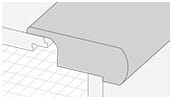
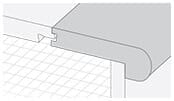
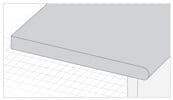



 Ultra-bas en COV
Ultra-bas en COV
